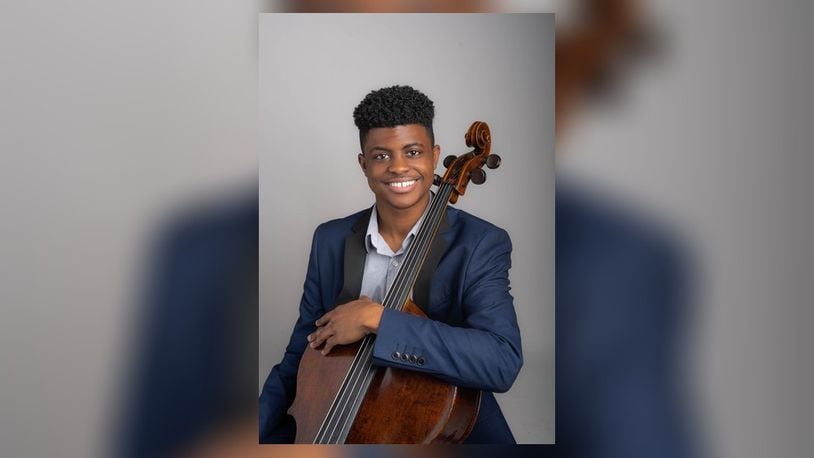“This piece isn’t necessarily regarded among the legendary cello concertos of Dvořák and Elgar, but I’ve certainly been making the case as such because I think it deserves that title,” said Elliott. “This is a piece a lot of cellists first encounter at a very young age as well. The same is true for me. I last played this piece when I was 10 years old. But it’s so wonderful to bring a truly wonderful piece of music onto the professional concert stage with a full orchestra. I’ve been falling back in love with it.”
Born and raised in Newport News, Virginia, Elliott said he initially wanted to play the violin like his mother and two siblings. But at age 3, he began his bond with the cello with a humorous nudge from his mother.
“I would cry and not want to play the cello because everyone else in my family was playing the violin,” he recalled. “My mom convinced me to play the cello with a great white lie. She said cellists make more money. And I guess as a 3-year-old, the green was talking. But as I grew older, the role of being the basement foundation of an ensemble, orchestral or chamber, was very enticing to me, so I felt like I had a pivotal role at all times. The sound of the cello is also so mellow and soothing. I quickly fell in love with it.”
Credit: CONTRIBUTED
Credit: CONTRIBUTED
Acclaimed for his stellar stage presence and joyous musicianship, Elliott is a 2021 Avery Fisher Career Grant recipient and is a Kovner Fellow at the Juilliard School where he is pursuing his Master of Music degree. He completed his undergraduate degree in cello performance at Juilliard in May 2021. He has also appeared with such major orchestras as the Philadelphia Orchestra, the New York Philharmonic, the Boston Symphony, the Cleveland Orchestra, the Los Angeles Philharmonic, the Detroit Symphony, and the Dallas Symphony. He notably made his German debut in Munich in May 2022.
According to DPO Artistic Director and Conductor Neal Gittleman, Elliott was recommended by DPO assistant principal bass player Jon Pascolini, who also plays in the West Virginia Symphony.
“Young soloists are always exciting for the audience to get to know,” said Gittleman.
“Not just because they’re inspiring, but also because if the (DPO) builds an ongoing relationship with a soloist – as we’ve done with violinist Chad Hoopes, for instance – the audience can really get to know them as they grow up and continue to come back to play with us again and again.”
Gittleman also holds the Saint-Saëns concerto in high regard.
“It’s one of those nearly-perfect pieces of music – exciting, tuneful, flashy but also sometimes intimate,” he said. “Saint-Saëns is often considered less than first-rate, but I think he was an amazing composer.”
Exploring Beethoven
The season finale also features Mozart’s “Missa brevis (brief mass), which features a “cameo” appearance by the organ. The piece will also incorporate the DPO Chorus under the direction of Steven Hankle. Additional guest artists include soprano Kayla Oderah, mezzo-soprano Allison Deady, tenor Carl Rosenthal and bass Sankara Harouna. The concert will conclude with Beethoven’s jubilant “Symphony No. 2,” which also concludes the DPO’s Beethoven symphony cycle.
“The Beethoven symphonies cycle seemed like it took forever, but it was actually four years – just one year longer than the first cycle that we did during my first three seasons,” Gittleman explained. “Of course, we’ve been playing Beethoven symphonies periodically all along, but these were two conscious efforts to play all of them in a defined period of time. For me, the Second is very special, because it’s when the greatness of Beethoven really starts to make itself apparent. The big innovation in the Second is the slow movement, which is a set of variations. The Beethoven Symphony is just a wonderful way to end a wonderful Masterworks season.”
Credit: CONTRIBUTED
Credit: CONTRIBUTED
As Elliott prepares his visit to Dayton, he is mindful of the importance of diverse representation in the classical realm. He hopes his presence will be inspiring and motivating to a broader audience.
“It’s about breaking down barriers into classical music,” he said. “Classical music is still viewed as a very elitist art form unfortunately. It is also viewed as unattainable or something not intended for certain communities. But as I’ve grown older it’s been wonderful to be able to impact students in particular. I want people to realize classical music is well within the bounds of our culture as Americans and it’s great to be one of the role models leading that perspective of representation.”
HOW TO GO
What: DPO Masterworks Series presents “Beethoven’s Second Symphony”
Where: Schuster Center, 1 W. Second St., Dayton
When: May 19-20; 7:30 p.m. Friday and Saturday
Cost: $5-$68
Tickets: 937-228-3630 or daytonperformingarts.org
FYI: Learn more about the featured works on the program when DPO Artistic Director and Conductor Neal Gittleman presents his “Take Note Talk” from the Mead Theatre stage of the Schuster Center from 6:30 p.m. to 7 p.m. prior to both performances.
About the Author
